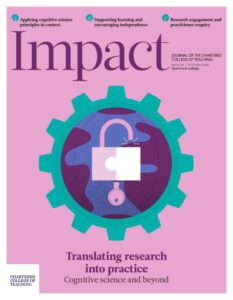Overcoming barriers to introducing metacognitive strategies to teaching professionals
Written by: Morgan Chatten

11 min read
Morgan Chatten, Cross-Trust Director of English – Teaching, Learning and Curriculum, Turner Trust, UK
The purpose of this article is to clarify what is meant by metacognition and to dispel myths and misunderstanding regarding its origin and use in contemporary education. The article aims to support leaders of teaching and learning to consider how they could begin to evaluate current metacognitive practices in schools and how they might go about supporting subject leaders and teachers in implementing metacognitive strategies.
It was 10 years ago that I first heard the term ‘metacognition’. Until then, I had been teaching with some naivety. I understood the nuts and bolts of a good lesson and I knew how to get my students to make ‘exceptional progress’, but the science of learning – the real cognitive impact of my actions and choices in the classroom – was lost on me. I quickly became engrossed, digesting seminars, papers and blogs.
Fast-forward a decade and me
Join us or sign in now to view the rest of this page
You're viewing this site as a guest, which only allows you to view a limited amount of content.
To view this page and get access to all our resources, join the Chartered College of Teaching (it's free for trainee teachers and half price for NQTs) or log in if you're already a member.
- Brennan M (1996) Multiple Professionalisms for Australian Teachers in an Information Age. New York: American Education Research Association.
- Dunlosky J and Metcalfe J (2008) Metacognition: A Textbook for Cognitive, Educational, Life Span and Applied Psychology. London:Sage Publications.
- Education Endowment Foundation (EEF) (2018) Metacognition and self-regulated learning: Seven recommendations for teaching and self-regulated learning and metacognition. Available at: https://educationendowmentfoundation.org.uk/education-evidence/guidance-reports/metacognition (accessed 5 May 2022)
- Education Endowment Foundation (EEF) (2021) Metacognition and self-regulated learning: School audit tool. Available at: https://d2tic4wvo1iusb.cloudfront.net/eef-guidance-reports/metacognition/7-SchoolAuditTool_2021-10-27-150642_ztrf_2021-10-29-074724_zdeo.pdf?v=1635493644 (accessed 27 July 2022).
- Education Endowment Foundation (EEF) (2022) Implementation plan template. Available at: https://educationendowmentfoundation.org.uk/public/files/Publications/Implementation/EEF-Implementation-Plan-Template.pdf (accessed 5 May 2022).
- Guskey R (2000) Evaluating Professional Development. California: Corwin Press.
- Hacker DJ, Dunlosky J and Graesser AC (2009) Handbook of Metacognition in Education. London: Taylor & Francis.
- Hattie, J (2009) Visible Learning: A synthesis of over 800 meta-analysis relating to achievement. Routledge. London: Taylor and Francis.3:22-28
- Lieberman A (2000) Networks as learning communities: Shaping the future of teacher development. Journal of Teacher Education 51(3): 223.
- Quigley A, Mujis D and Stringer E (2022) Metacognition and self-regulated learning: Guidance report. Education Endowment Foundation. Available at: https://d2tic4wvo1iusb.cloudfront.net/eef-guidance-reports/metacognition/EEF_Metacognition_and_self-regulated_learning.pdf?v=1635355221 (accessed 1 May 2022).
0
0
votes
Please Rate this content
Subscribe
Please login to comment
0 Comments
Inline Feedbacks
View all comments










